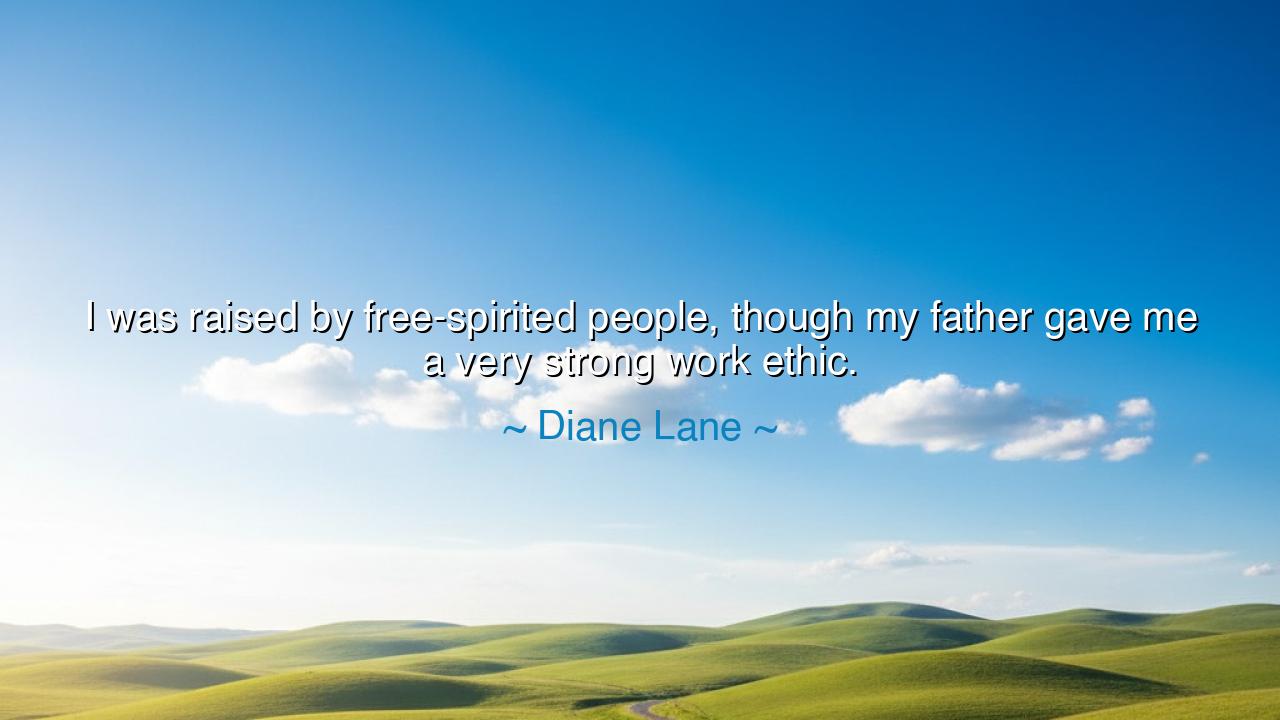
I was raised by free-spirited people, though my father gave me a
I was raised by free-spirited people, though my father gave me a very strong work ethic.






The words of Diane Lane—“I was raised by free-spirited people, though my father gave me a very strong work ethic”—carry the quiet grace of balance, the meeting of wind and stone, freedom and discipline. Within this brief reflection lies a profound truth about the shaping of the human soul: that the strongest lives are those forged between liberty and labor, between the wildness of inspiration and the steadiness of purpose. Lane, an artist and actress who has walked the shifting worlds of creativity and fame, speaks not only of her childhood but of the eternal struggle within every human being—to live freely without falling into chaos, and to work diligently without losing the lightness of spirit that makes life worth living.
In the ancient way, this harmony between freedom and work was considered the foundation of wisdom. The Greeks spoke of sophrosyne, the temperance that holds the soul in balance. Too much freedom leads to folly, too much labor to weariness. Only when both forces move together, like the wings of a bird, can one truly rise. Lane’s upbringing reflects this ancient balance. Her father’s work ethic anchored her to the earth, teaching her that effort is the language through which dreams become reality. Yet the free-spirited influences around her—those who lived by intuition, imagination, and daring—taught her to look to the sky, to see life not as duty alone but as an art to be lived. Thus, she inherited both the courage to dream and the discipline to fulfill those dreams.
Her words echo through time, for many great lives have been shaped by this same duality. Consider Leonardo da Vinci, who embodied the union of freedom and labor. His mind was boundless, his imagination soaring beyond his age, yet his devotion to craft and study was relentless. He drew, calculated, experimented, and built with tireless precision. It was not his genius alone that made him great, but his discipline, the silent companion to his creativity. Likewise, those who are raised amid freedom but anchored by labor possess the strength to bring beauty into being. They are not scattered by the wind of dreams, nor chained by the weight of toil—they walk the middle path, the way of harmony.
Lane’s father, by her account, gave her the gift of work. And that gift is among the greatest any parent can bestow. For work, rightly understood, is not punishment—it is purpose. The ancient farmers who tilled the soil under the morning sun knew this truth: that freedom without structure is like a field left wild—it grows weeds instead of wheat. The father’s lesson, then, was not to quench her spirit, but to give it form, to teach her that the flame of talent must be fed by the oil of effort. His ethic was the forge that strengthened the freedom her youth bestowed.
At the same time, the free-spirited people who surrounded her preserved something sacred—the playfulness and wonder that protect the soul from becoming mechanical. They reminded her, as the poets of old reminded kings, that a life without joy is a slow death, and that duty without delight turns the heart to iron. Their influence kept her inner fire alive, allowing her to bring warmth, imagination, and authenticity to her craft. Thus, the lesson of Lane’s upbringing is not one of opposition, but of synthesis: that one must learn both to dance and to endure, to wander and to work.
History has shown the peril of imbalance. The artist who works without discipline burns out in chaos; the laborer who toils without spirit becomes a machine. But those who unite both forces become like the artisan-saints of the Renaissance, who built cathedrals stone by stone, yet carved angels into every arch. They understood what Lane’s words imply: that freedom and work are not enemies, but two sides of the same divine coin. One gives meaning; the other gives movement.
So, dear listener, take this wisdom to heart. If your spirit is wild, learn the beauty of discipline, for work is the path that turns vision into legacy. And if your life is ruled by duty, remember to let your spirit breathe—to laugh, to create, to feel the sunlight upon your face. Seek the middle path where joy and diligence, freedom and focus, dwell together. Cultivate both the sky of the dreamer and the soil of the worker, for life demands both to bloom.
Thus, the words of Diane Lane become more than remembrance—they become a teaching for all generations: that greatness is not born from rebellion alone, nor from labor alone, but from the sacred marriage of the two. Be free in your heart, steadfast in your hands, and wise in your balance. For it is through this union that life becomes not merely lived, but crafted—a masterpiece of both spirit and strength.






AAdministratorAdministrator
Welcome, honored guests. Please leave a comment, we will respond soon